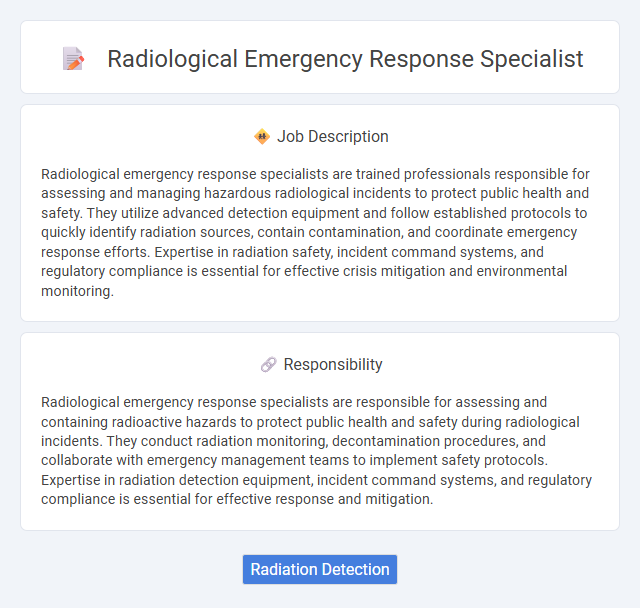
Radiological emergency response specialists are trained professionals responsible for assessing and managing hazardous radiological incidents to protect public health and safety. They utilize advanced detection equipment and follow established protocols to quickly identify radiation sources, contain contamination, and coordinate emergency response efforts. Expertise in radiation safety, incident command systems, and regulatory compliance is essential for effective crisis mitigation and environmental monitoring.
Individuals with strong analytical skills, resilience under pressure, and a calm demeanor may be well-suited for a radiological emergency response specialist role, given the high-stress environment and critical decision-making required. People who possess a background in health physics, emergency management, or related scientific fields are likely to adapt effectively to the technical demands and safety protocols of the job. Those who struggle with stress management or lack attention to detail may find it challenging to meet the rigorous standards necessary for successful performance in this specialty.
Qualification
Radiological emergency response specialists are required to have advanced training in radiation safety, emergency preparedness, and hazardous materials management. Certifications such as the Certified Health Physicist (CHP) or Nuclear Medicine Technology Certification enhance job prospects and demonstrate expertise. A background in nuclear engineering, health physics, or environmental science combined with hands-on experience in radiological emergency drills is essential for qualification.
Responsibility
Radiological emergency response specialists are responsible for assessing and containing radioactive hazards to protect public health and safety during radiological incidents. They conduct radiation monitoring, decontamination procedures, and collaborate with emergency management teams to implement safety protocols. Expertise in radiation detection equipment, incident command systems, and regulatory compliance is essential for effective response and mitigation.
Benefit
Radiological emergency response specialists likely receive benefits such as comprehensive health insurance and retirement plans, reflecting the high-risk nature of their work. They may also gain access to specialized training and professional development opportunities that enhance their expertise and career advancement. Competitive salaries and job stability are probable due to the critical role they play in public safety and environmental protection.
Challenge
Radiological emergency response specialists likely face significant challenges in managing unpredictable hazardous situations that require quick, precise decision-making to protect public health. The role probably entails dealing with high-pressure environments where effective communication and teamwork are critical to successfully containing radiological threats. Navigating complex safety protocols and continuously updating knowledge on radiation technology and response techniques may also be demanding aspects of this job.
Career Advancement
Radiological emergency response specialists gain expertise in hazardous material containment, radiation detection, and incident management, positioning themselves for leadership roles in public safety and environmental protection agencies. Advanced certifications and specialized training in nuclear safety and emergency preparedness enhance career prospects, enabling progression to managerial or technical advisory positions. Mastery of regulatory compliance and inter-agency coordination further supports advancement into strategic planning and policy development within governmental and private sectors.
Key Terms
Radiation Detection
Radiological emergency response specialists utilize advanced radiation detection technologies to identify and measure radioactive materials during incidents, ensuring public safety and environmental protection. They operate devices such as Geiger-Muller counters, scintillation detectors, and dosimeters to monitor radiation levels accurately and rapidly assess contamination zones. Expertise in radiation detection enables these specialists to provide critical data for containment, decontamination, and risk assessment efforts in nuclear accidents or radiological emergencies.
 kuljobs.com
kuljobs.com